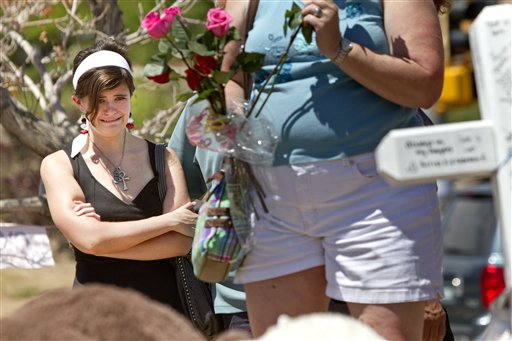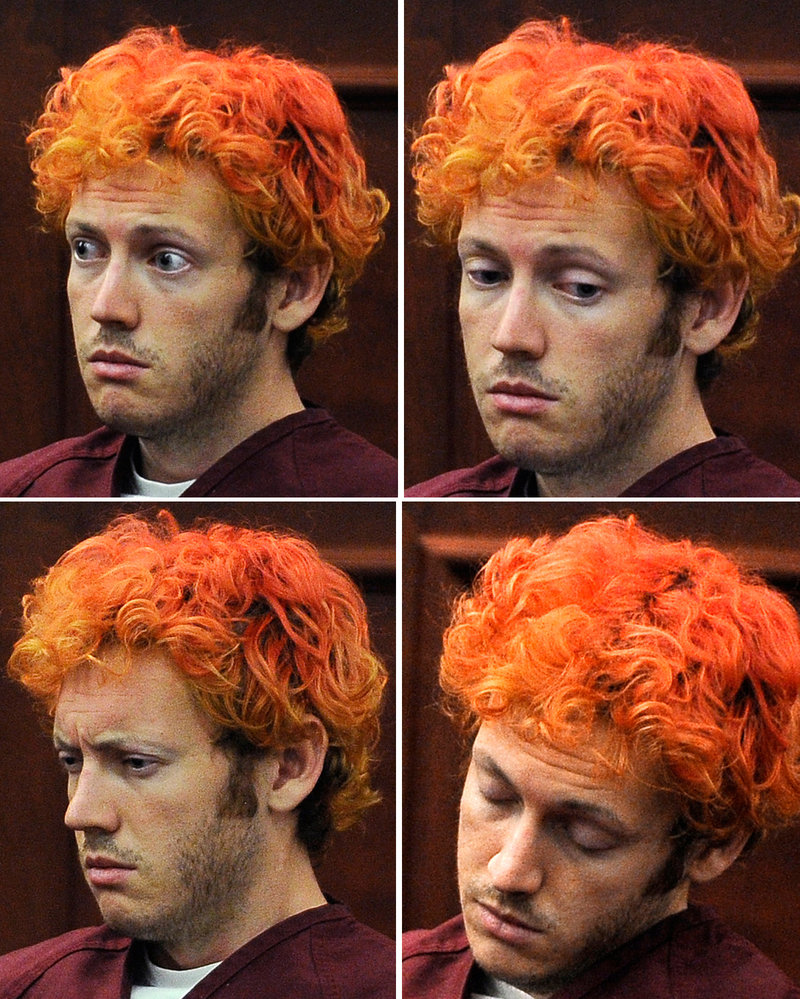CENTENNIAL, Colo. — With their anger and tears stirred by the sight of James Holmes in a courtroom with red hair and glassy eyes, the families of those killed in the Colorado theater massacre now must go home to plan their final goodbyes.
Tom Teves’ stare bore into Holmes as the 24-year-old former graduate student sat as though in a daze during his court appearance Monday. Teves’ son was one of the 12 people Holmes is accused of killing after Alex Teves dove to protect his girlfriend in the shooting early Friday.
Another 58 were wounded, including seven critically, when a gunman opened fire at a midnight showing of “The Dark Knight Rises” in nearby Aurora.
The father called the red-and-orange-haired object of his anger “a coward” for allegedly mowing down defenseless victims, including a girl.
“Somebody had to be in the courtroom to say, ‘You know what? You went in with ballistic protection and guns, and you shot a 6-year-old,'” he said. “And then when the cops came, you gave up? You’ve got the ballistic protection on. Take on some guys who know how to use guns.”
That anger spilled out when the world got its first view of Holmes, shuffling into court in a maroon jailhouse jumpsuit. Relatives of the shooting victims leaned forward in their seats. Two women held hands tightly, one shook her head. One woman’s eyes welled up with tears.
Robert Blache watched video clips from the 12-minute court appearance with his injured daughter Christina, who was shot in both legs during the rampage, and questioned Holmes’ sanity.
“He doesn’t look surprised at any of it, but he seemed amazed at what was happening. I’m pretty sure he’s not sane,” Blache said.
To Dr. Jeffrey Gardere, an assistant professor of behavioral medicine at Touro College of Osteopathic Medicine, Holmes looked like “a person who’s been through an emotional maelstrom and therefore might be totally wiped out emotionally.”
Gardere said there could be “a psychotic process going on, and we see that being acted out there. Or, there might be some sort of malingering going on. In other words, trying to make himself look worse than he actually is. Or maybe a combination of all of those things.”
After Holmes was led in handcuffs to the solitary confinement cell where he’d been held since Friday, the families of the dead were left to plan the next steps that they must take.
“We have people from out of town, and some of them need to go home and arrange funerals,” said Boulder Police Department information officer Kim Kobel.
Kobel was one of the public information officers assigned to each family to make sure that they will still receive information — and can get their messages to the media — when they are gone.
Holmes is being held on suspicion of first-degree murder, and he could face additional counts of aggravated assault and weapons violations. Holmes has been assigned a public defender.
His prosecution is likely to be a long road. He won’t be formally charged until next Monday, and police expect months of working with behavioral analysts and scrutinizing Holmes’ relationships to establish a motive. As for a trial, that could take more than a year, said prosecutor Carol Chambers.
Chambers said her office is considering the death penalty, but that a decision will be made in consultation with the victims’ families.
David Sanchez said that would be the appropriate punishment if Holmes is convicted. He said his pregnant daughter escaped without injury but her husband was shot in the head and was in critical condition. His 21-year-old daughter, Katie Medley, was scheduled to deliver her baby at any time.
“When it’s your own daughter and she escaped death by mere seconds, I want to say it makes you angry,” Sanchez said. He said Medley and her husband, Caleb, 23, waited a year to watch the movie.
Chambers’ office is responsible for the convictions of two of the three people on Colorado’s death row. Chambers also is the only state district attorney to seek the death penalty in any case in the last five years, said Michael Radelet, a sociology professor at the University of Colorado at Boulder who tracks death penalty cases.
Colorado uses the death penalty relatively sparingly. It has executed just one inmate since capital punishment was reinstated by the U.S. Supreme Court in 1976. The state legislature fell one vote short of abolishing the death penalty in 2009.
At a news conference in San Diego, where Holmes’ family lives, their lawyer refused to answer questions about him and his relationship to the family. Lisa Damiani said later: “Everyone’s concerned” about the possibility of the death penalty.
When asked if they stood by Holmes, Damiani said, “Yes, they do. He’s their son.”
Weeks before, Holmes quit a 35-student Ph.D. program in neuroscience for reasons that aren’t clear. He had earlier taken an intense oral exam that marks the end of the first year but University of Colorado Denver officials would not say if he passed, citing privacy concerns.
University officials have refused to answer questions about Holmes.
“To the best of our knowledge at this point, we think we did everything that we should have done,” Donald Elliman, the university chancellor, told reporters.
The judge has issued an order barring lawyers in the case from publicly commenting on matters including evidence, whether a plea deal is in the works or results of any examination or test.
Send questions/comments to the editors.




Comments are no longer available on this story